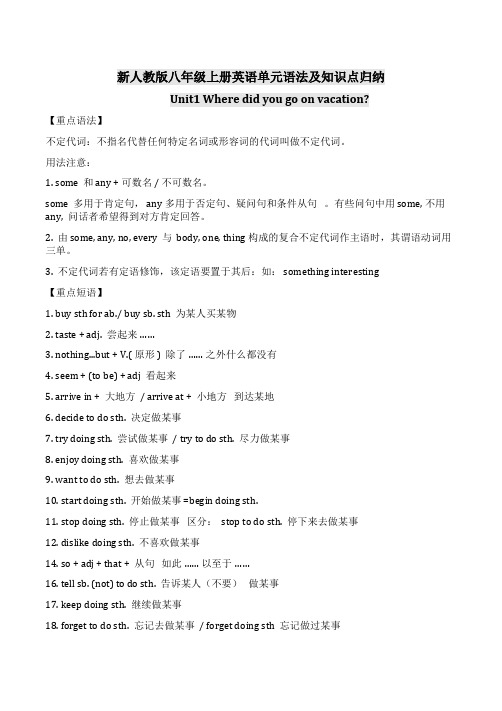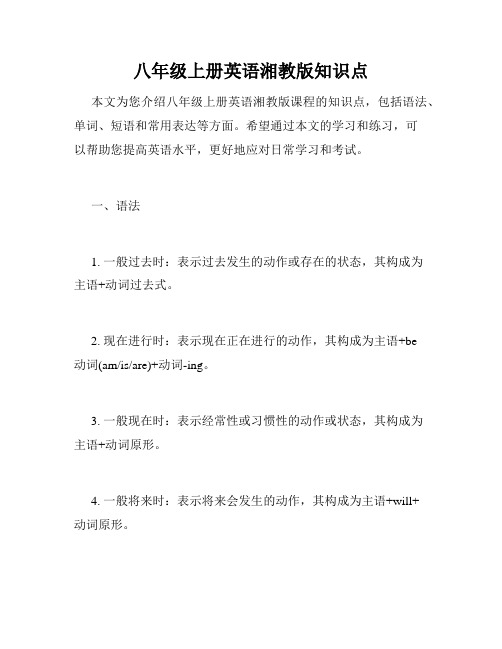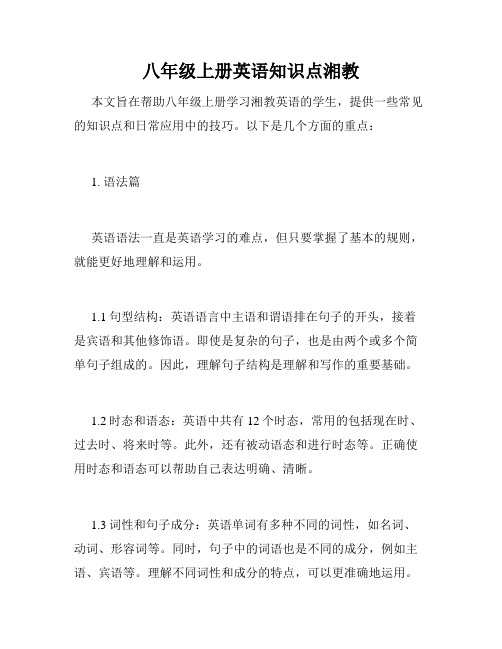湘教版初二英语(八年级)上册期末知识点归纳.
湘教版英语八年级上册初二英语知识点

新人教版八年级上册英语单元语法及知识点归纳Unit1 Where did you go on vacation?【重点语法】不定代词:不指名代替任何特定名词或形容词的代词叫做不定代词。
用法注意:1. some 和any + 可数名/ 不可数名。
some 多用于肯定句,any 多用于否定句、疑问句和条件从句。
有些问句中用some, 不用any, 问话者希望得到对方肯定回答。
2. 由some, any, no, every 与body, one, thing 构成的复合不定代词作主语时,其谓语动词用三单。
3. 不定代词若有定语修饰,该定语要置于其后:如:something interesting 【重点短语】1. buy sth for ab./ buy sb. sth 为某人买某物2. taste + adj. 尝起来3. nothing...but + V.( 原形) 除了之外什么都没有4. seem + (to be) + adj 看起来5. arrive in + 大地方/ arrive at + 小地方到达某地6. decide to do sth. 决定做某事7. try doing sth. 尝试做某事/ try to do sth. 尽力做某事8. enjoy doing sth. 喜欢做某事9. want to do sth. 想去做某事10. start doing sth. 开始做某事=begin doing sth.11. stop doing sth. 停止做某事区分:stop to do sth. 停下来去做某事12. dislike doing sth. 不喜欢做某事14. so + adj + that + 从句如此以至于16. tell sb. (not) to do sth. 告诉某人(不要)做某事17. keep doing sth. 继续做某事18. forget to do sth. 忘记去做某事/ forget doing sth 忘记做过某事【词语辨析】1. take a photo/ take photos 拍照quite a few+ 名词复数“许多”2. seem + 形容词看起来... You seem happy today.seem + to do sth. 似乎/ 好像做某事I seem to have a coldIt seems + 从句似乎.. . It seems that no one believe you.seem like ... 好像,似乎.. It seems like a good idea.3. arrive in + 大地点= get to= reach+ 地点名“到达...... ”arrive at + 小地点(注:若后跟地点副词here/there/home, 介词需省略,如:arrive here; get home )4. feel like sth 感觉像feel doing sth. 想要做某事5. wonder (想知道)+ 疑问词(who, what, why) 引导的从句。
八年级上英语期末考试知识点

八年级上英语期末考试知识点本文主要介绍八年级上英语期末考试的知识点,包括词汇、语法、阅读和听力等方面,共分为四个部分。
一、词汇1. 名词常见的名词有人名、地名、国家名称、学科名称等等。
在考试中,可以通过选择题或填空题来测试对名词的掌握。
2. 动词掌握动词的时态和语态是英语学习的一个重要环节。
必须熟练掌握各种时态的用法,如一般现在时、一般过去时、现在进行时、过去进行时等等。
3. 形容词和副词形容词和副词是描述人、事物或感受的词语,要正确运用表示程度或比较级的形容词和副词。
二、语法1. 时态和语态掌握各种时态和语态的用法是英语学习的关键。
要注意在不同情况下选择不同的时态和语态。
2. 介词和冠词介词是修饰名词或代词的重要词汇。
在日常生活中,介词用法很多,要注意掌握各种情况下的使用规则。
冠词则是修饰名词的一种词语,包括定冠词和不定冠词。
3. 主谓一致在考试中,通常会考察主谓一致问题。
考生需要理解主语和谓语之间的关系,正确选择单数或复数形式。
三、阅读阅读理解是英语学习的核心部分之一,主要考察考生对短文和文章的理解能力。
考题形式包括选择、填空和简答等题型,要求考生仔细研读题目,理解文章的含义和主旨。
四、听力听力是英语能力的重要组成部分,也是考试中常见的一种题型。
考生需要通过听力材料听懂其含义,正确回答听力题目。
结语以上是八年级上英语期末考试的主要知识点,希望大家复习的时候能够认真对待,加强对英语基础知识的掌握和运用,达到更好的考试成绩。
湘教版英语八年级上册学习要点湘教

湘教版英语八年级上册学习要点Unit 1 Playing sportsToptic 1 What 's your favorite sport ?Section A in topic one1.be going to do sth. 表示计划、安排、打算要去做某事 be 随前面的主语的变化而变化Example(例如):They are going to have a picnic this Sunday ? 试将此句变为一般疑问句,然后进行肯定、否定回答2. see sb. do sth. 看见某人做某事, sb. 之后跟动词原形,表示“一个事件或者说明某个事实”,能这样用的动词还有: hear , watch sb. do sth.I often see the boys play football on the playgronud.(我常常看见这些孩子在运动场上踢足球)I often hear the girl sing the song..(我经常听见这个女孩唱那首歌。
)3. will do sth. 一般将来时:表示在现在看来即将发生的动作,其主要标志是有表示将来的时间状语,如:tomorrow , tha day after tomorrow , next week / month / year / Sunday , this Sunday / Saturday4. the basketball game between A and B 在 A 与B之间的篮球比赛5. cheer sb. on 为某人加油Example(例如):I hope you can cheer us on .6. I hope + 句子我希望…Example(例如):I hope you can learn English well.7.prefer A to B A与B 相比更喜欢AExample(例如):I prefer football to basketball .8. prefer doing A to doing B A与B 相比更喜欢AExample(例如):I prefer learning English to learning maths.9. Do you skate much ? much 表示程度,相当于 very often10.be panning to have a ….. club 计划成立……俱乐部Example(例如):We are planning to have a basketball club next week.11.Will you join us ? Yes , I willl. No, I won't .12. Patterns(句型):What 's your favorite sport ? My favorite sport is ......Why do you like it ? Because it is .....Section B in topic one1. What 's your favorite sport ? My favorite sport is ......2. Who's your favorite player ?Name (名字) Ssport (运动) Born palceand year(出生地点、年份)Age (年龄) Reasons(原因)Yao Ming Basketball 1980.,Shanghai 26 Great /famous3. arrive in ( 大地方,一般指城市) arrive at (小地方,一般指乡镇)4.play gaginst 与…. 比赛Example(例如):Our class basketball team will play against the team form Class Four this Friday afternoon.(我们班的篮球队将于星期五下午跟四般的球队进行比赛。
湘教版英语八年级上册初二英语知识点

新人教版八年级上册英语单元语法及知识点归纳Unit1 Where did you go on vacation?【重点语法】不定代词:不指名代替任何特定名词或形容词的代词叫做不定代词。
用法注意:1. some 和 any + 可数名 / 不可数名。
some 多用于肯定句, any 多用于否定句、疑问句和条件从句。
有些问句中用 some, 不用any, 问话者希望得到对方肯定回答。
2. 由 some, any, no, every 与 body, one, thing 构成的复合不定代词作主语时,其谓语动词用三单。
3. 不定代词若有定语修饰,该定语要置于其后:如: something interesting【重点短语】1. buy sth for ab./ buy sb. sth 为某人买某物2. taste + adj. 尝起来……3. nothing...but + V.( 原形 ) 除了…… 之外什么都没有4. seem + (to be) + adj 看起来5. arrive in + 大地方 / arrive at + 小地方到达某地6. decide to do sth. 决定做某事7. try doing sth. 尝试做某事 / try to do sth. 尽力做某事8. enjoy doing sth. 喜欢做某事9. want to do sth. 想去做某事10. start doing sth. 开始做某事 =begin doing sth.11. stop doing sth. 停止做某事区分: stop to do sth. 停下来去做某事12. dislike doing sth. 不喜欢做某事14. so + adj + that + 从句如此…… 以至于……16. tell sb. (not) to do sth. 告诉某人(不要)做某事17. keep doing sth. 继续做某事18. forget to do sth. 忘记去做某事 / forget doing sth 忘记做过某事【词语辨析】1. take a photo/ take photos 拍照quite a few+ 名词复数“ 许多…”2. seem + 形容词看起来…... You seem happy today.seem + to do sth. 似乎 / 好像做某事 I seem to have a coldIt seems + 从句似乎..…. It seems that no one believe you.seem like ... 好像,似乎….. It seems like a good idea.3. arrive in + 大地点 = get to= reach+ 地点名“ 到达......”arrive at + 小地点(注:若后跟地点副词 here/there/home, 介词需省略,如: arrive here; get home )4. feel like sth 感觉像…feel doing sth. 想要做某事5. wonder (想知道) + 疑问词( who, what, why) 引导的从句。
八年级上册英语湘教版知识点

八年级上册英语湘教版知识点本文为您介绍八年级上册英语湘教版课程的知识点,包括语法、单词、短语和常用表达等方面。
希望通过本文的学习和练习,可以帮助您提高英语水平,更好地应对日常学习和考试。
一、语法1. 一般过去时:表示过去发生的动作或存在的状态,其构成为主语+动词过去式。
2. 现在进行时:表示现在正在进行的动作,其构成为主语+be动词(am/is/are)+动词-ing。
3. 一般现在时:表示经常性或习惯性的动作或状态,其构成为主语+动词原形。
4. 一般将来时:表示将来会发生的动作,其构成为主语+will+动词原形。
5. 情态动词:用于表示某种情况或推测,常用的情态动词有can、could、may、might、must、shall、should、will和would等。
二、单词1. 名词:表示人、物、地点、植物等,如book、desk、teacher、China等。
2. 动词:表示动作或状态,如go、play、read、draw等。
3. 形容词:表示人或事物的特征或品质,如big、small、nice、happy等。
4. 副词:表示程度、频率、时间或方式,如often、fast、well、soon等。
5. 代词:用来代替名词或其他代词,如he、she、it、they、this 等。
三、短语1. be used to:习惯于,适应于。
2. go to school:去上学。
3. at the beginning of:在……的开始。
4. be afraid of:害怕。
5. take photos:拍照。
四、常用表达1. How do you do?:你好。
2. What's your name?:你叫什么名字?3. How are you?:你好吗?4. I'm sorry.:对不起。
5. Thank you.:谢谢。
以上仅为部分知识点的介绍,希望通过学习和练习,能够更好地掌握八年级上册英语湘教版的知识点,提高英语水平。
2022-2023 学年湘教版八年级上册 英语复习提纲

2022-2023 学年湘教版八年级上册英语复习提纲Unit 1: Our World- Vocabulary:- Words related to the environment and nature- Words related to global issues and problems- Grammar:- Present simple tense- Expressions of purposeUnit 2: Seeing the Doctor- Vocabulary:- Words related to medical conditions and symptoms- Words related to visiting a doctor and medical treatment- Grammar:- Past simple tense- Modal verbs for obligation and suggestion- Indirect speechUnit 3: Life in the Future- Vocabulary:- Words related to future predictions and technologies - Words related to future jobs and careers- Grammar:- Future tenses- Conditional sentences- Passive voiceUnit 4: Hobbies and Interests- Vocabulary:- Words related to hobbies and interests- Words related to leisure activities and sports- Grammar:- Present continuous tense- Present perfect tense- Adverbs of frequencyUnit 5: Daily Routine- Vocabulary:- Words related to daily activities and routines- Words related to household chores and responsibilities - Grammar:- Present simple vs. present continuous tense- Present perfect vs. past simple tense- Reflexive pronounsUnit 6: Travel and Transportation- Vocabulary:- Words related to travel and transportation- Words related to planning a trip and making reservations - Grammar:- Future continuous tense- Prepositions of place and direction- Phrasal verbsUnit 7: Healthy Lifestyle- Vocabulary:- Words related to health and well-being- Words related to healthy habits and behaviors - Grammar:- Modal verbs for advice and prohibition- Gerunds and infinitivesUnit 8: Cultural Differences- Vocabulary:- Words related to cultural traditions and customs - Grammar:- Past continuous tense- Reported speech- Conditional sentencesUnit 9: Discovering Science- Vocabulary:- Words related to scientific discoveries and inventions - Words related to scientific experiments and research - Grammar:- Present perfect continuous tense- Passive voice with reporting verbs- Relative clausesUnit 10: Media and Entertainment- Vocabulary:- Words related to media and entertainment- Words related to types of media and popular culture - Grammar:- Past perfect tense- Modal verbs for speculation and deduction- Adjective clausesUnit 11: Festivals and Celebrations- Vocabulary:- Words related to festivals and celebrations- Words related to holiday traditions and customs- Grammar:- Past perfect continuous tense- Indirect questions- Subjunctive moodUnit 12: Global Issues- Vocabulary:- Words related to global issues and challenges- Words related to sustainable development and activism - Grammar:- Future perfect tense- Inversion for emphasis- Conditional clauses以上是2022-2023学年湘教版八年级上册英语复习提纲,涵盖了每个单元的词汇和语法内容。
八年级上册英语知识点湘教

八年级上册英语知识点湘教本文旨在帮助八年级上册学习湘教英语的学生,提供一些常见的知识点和日常应用中的技巧。
以下是几个方面的重点:1. 语法篇英语语法一直是英语学习的难点,但只要掌握了基本的规则,就能更好地理解和运用。
1.1句型结构:英语语言中主语和谓语排在句子的开头,接着是宾语和其他修饰语。
即使是复杂的句子,也是由两个或多个简单句子组成的。
因此,理解句子结构是理解和写作的重要基础。
1.2时态和语态:英语中共有12个时态,常用的包括现在时、过去时、将来时等。
此外,还有被动语态和进行时态等。
正确使用时态和语态可以帮助自己表达明确、清晰。
1.3词性和句子成分:英语单词有多种不同的词性,如名词、动词、形容词等。
同时,句子中的词语也是不同的成分,例如主语、宾语等。
理解不同词性和成分的特点,可以更准确地运用。
2. 词汇篇英语词汇的学习需要坚持长期积累和实践,以下是一些日常学习中的小技巧:2.1背单词:背英语单词是学习词汇的基础。
可以利用背单词软件、单词书等多种方式进行背诵。
重点是要坚持每天背诵,持之以恒。
2.2看英文字幕:看英语电影或电视剧时,可以开启英文字幕,学习和熟识不熟悉的单词和短语,提高听力和阅读技能。
2.3运用单词:遇到不认识的单词时,可以在线翻译或查词典,同时积极运用新学单词,以加深印象。
可以尝试用新单词写简单的句子,串联成一个小故事。
3. 阅读篇英语阅读是英语学习的重要部分。
以下是一些阅读技巧:3.1了解背景:在阅读文章前,了解文章所处的背景和文化环境,可以更好地理解和解读。
3.2抓主旨:抓住文章的主旨或中心思想,可以更好地掌握文章的重点,同时可以避免在细节上花费过多时间。
3.3积累短语:阅读时,可以积累一些常用的短语,如“in conclusion”、“first of all”等,以便更加流畅和准确地表达。
4. 口语篇英语口语训练需要不断地练习和实践,以下是一些口语技巧:4.1多听多说:多听英语广播、电视、歌曲等,模仿语调和节奏,多说英语,练习口语能力和语音准确性。
八年级上册英语湘教版

八年级上册英语湘教版知识点总结一、重点词汇及注解1. communicate [kəˈmjuːnɪkeɪt]-注解:交流;沟通。
常指人与人之间通过语言、文字、手势等方式交换信息或表达想法。
-例句:We can communicate with each other by phone.(我们可以通过电话相互交流。
)2. improve [ɪmˈpruːv]-注解:提高;改善。
可以用于表示能力、成绩、生活质量等方面的提升。
-例句:You need to improve your English pronunciation.(你需要提高你的英语发音。
)3. nervous [ˈnɜːvəs]-注解:紧张的;焦虑的。
通常形容人在面对压力、考试、重要场合等时的情绪状态。
-例句:I feel very nervous when I speak in public.(当我在公众场合讲话时,我感到非常紧张。
)4. patient [ˈpeɪʃnt]-注解:有耐心的;能忍耐的。
用于形容人对待他人或事情时不急躁,能够耐心等待或处理。
-例句:The teacher is very patient with her students.(这位老师对她的学生非常有耐心。
)5. respect [rɪˈspekt]-注解:尊敬;尊重。
表示对他人的品质、地位、意见等的敬重。
-例句:We should respect our parents and teachers.(我们应该尊敬我们的父母和老师。
)6. expression [ɪkˈspreʃn]-注解:表情;表达方式。
可以指面部表情,也可以指语言、文字等用来表达情感或想法的方式。
-例句:Her expression showed that she was angry.(她的表情显示她生气了。
)7. achieve [əˈtʃiːv]-注解:实现;达到。
通常用于表示通过努力达成目标、取得成就等。
- 1、下载文档前请自行甄别文档内容的完整性,平台不提供额外的编辑、内容补充、找答案等附加服务。
- 2、"仅部分预览"的文档,不可在线预览部分如存在完整性等问题,可反馈申请退款(可完整预览的文档不适用该条件!)。
- 3、如文档侵犯您的权益,请联系客服反馈,我们会尽快为您处理(人工客服工作时间:9:00-18:30)。
湘教版初二英语(八年级)上册期末知识点归纳(白沙中学)Unit 1第一部分.词语辨析take part in/join in /be in 参加活动see sb /sth do sth 看到某人干某事play against 与……比赛cheer sb on为某人加油prefer doing 喜欢做某事leave for出发去某地grow up长大all over the world全世界make /keep sb/sth +adj.使某人或某物……quite a lot/bit相当多pretty well相当好have a good day!过得愉快What a shame!很遗憾prepare for为……做准备mind (not) doing介意(不)做某事do sb.a favor帮助某人shout at sb对某人大喊大叫be angry with sb生某人的气do one’s best尽力say sorry to sb对某人说抱歉be sure to do sth确定做某事be important to sb/sth对……重要build sb/sth up增强体质have fun doing sth乐于做某事make friends with sb与某人交朋友stand for代表take some photos照相do well/badly in在……做得好/差as well也be able to 能够做某事take exercise锻炼a symbol of……的象征arrive in/at到达be ready for为……做准备第二部分单元短语与句型1.人+spend some time/money on sth/in doing sth花费时间或者金钱在某事上/做某事人+pay some money for sth物+cost/ take help sb (to) do something=do sb. a favor=give sb a hand2. 借I can lend you some tapes of her songs. 主语借出We often borrow books from the library.主语借进Can I borrow your bike?我能借你的自行车吗?=Can you lend me your bike?=Can you lend your bike to me? 你可以借你的车给我吗?3.keep him active/healthy, keep the classroom clean, keep the thief waiting and standing outside,keep trying4. help sb with sth在某方面帮助某人The Internet can help us to do a lot of things.help名词with the help of Jane=with Jane’s help 反义词without5. plan名词the plan s for this year/next week动词How do you plan to celebrate it?=How are you going to celebrate it?6. exciting, excited, interesting, interested, tiring, tired(说人用ing, 形容物用ed)The movie was very exciting. People are excited.an exciting movieThe stories are very interesting. He is very interested in it.an interesting storyThe job is tiring. She is very tired of it. You have a tiring job.7. 著名be famous for China is famous for the Great Wall. 因。
而闻名be famous as Chongqing is famous as the Moutain City.称之为,美誉8.I saw you play basketball almost every day.通常Hey, look! Can you see Michael dancing in the zoo? 正在进行Listen, someone is singing in the next room.正在进行Look, a car is driving towards us. 正在进行9.Would you like to come and cheer us on?=Do you want to come and cheer us on? 10.start to do sth/doing sth=begin to do sth/begin doing sth开始做某事11.He speak so loudly that we can hear him clearly.以至于He ran so fast that he won the game.12.be ready for I am ready for the exam.我准备好考试了。
be ready to do sth She is always ready to help others. 她总是乐于助人。
13.Our school will hold a sport meet next week.= There will be a sports meet in our school next week.第三部分经典句子We are going to have a basketball game against Class Three this Sunday.There is going to be a school sports meet next weekend.There will be another exciting relay race this afternoon.I’ll be in the long jump and the high jump.Which sport do you prefer ,cycling or rowing?I prefer rowing.Could you please do me a favor?Sure. What is it?What do you mean by saying that?That’s very king of you, but I can manage it myself.I think I will have lots of fun.Let,s make it half past six.I’ll meet you there and take some photos.第四部分主要语法分析和例子1.一般将来时be going to/will+动词原形(包括be)We are going to have a basketball game against Class Three this Sunday.将来时What are you going to be when you grow up? What do you want to be in the future?I’m going to be a dancer.I want to be a dancer.There be 的将来时There is going to be/There will be, 过去式There was/were, There used to be 过去常常, 现在时There is/are2. 介意句型Would you mind helping me ?你介意帮我个忙吗?Would you mind not opening the window?你介意/可不可以不要开窗?Would you mind my opening the window/me smoking here?我开窗户可以吗?你介意我开窗户吗?回答如果允许,表示不介意,那么就用Of course not/Certainly not/ Not at all.不允许,介意,Sorry, you’d better not/ you’d better ask somebody else/smoke somewhere else. miss a chance/ a goal/the bus错过机会/球门/班车第五部分课堂精炼Topic 1一.词汇。
(A)根据汉语提示,完成下列句子。
1. When did Beckham (抵达) Beijing?2. She is going to (参加) the high jump.3. Our team will (同……比赛) the team from No. 2 High School.4. I (花费) too much time watching television.5. I want to be a teacher (今后).(B) 根据句意及首字母提示补全单词。
6. Let’s c Liu Xiang on.7. Will you j us for lunch?8. What do you want to be when you g up?9. She is a little b fat.10. I p playing volleyball to playing football.二.单项选择。
( ) 1. I see Wei Han ____ English almost every morning.A. readsB. readingC. readD. to read( ) 2. I will play in the soccer game. Will you come and ____?A. cheer to meB. cheer for meC. cheer me onD. cheer me up ( ) 3. Deng Yaping and her teammates are ____ the U.S.A. next week.A. leave forB. leaving forC. leaving toD. left( ) 4. — What sport did you take part in yesterday?— ____A. The high jump.B. High jump.C. The jump high.D. Jump high. ( ) 5. — ____— Basketball, of course.A. What’s your favorite animal?B. What’s your favorite sport?C. Would you like to play football with me?D. Do you like playing basketball?( ) 6. — ____ do you go to the library?— Every week.A. How longB. How soonC. How oftenD. How many times ( ) 7. — ____ are you going to stay in Japan?— For two weeks.A. How longB. How soonC. How oftenD. When( ) 8. — What are you going to ____ when you grow up?—I’m going to be a singer.A. doB. beC. singD. does( ) 9. I prefer ____ to ____.A. sing; danceB. singing; dancingC. singing; danceD. sing; dancing( ) 10. Yi Jianlian is playing ____ Guangdong team in the CBA.A. forB. againstC. withD. to三.情景交际。
